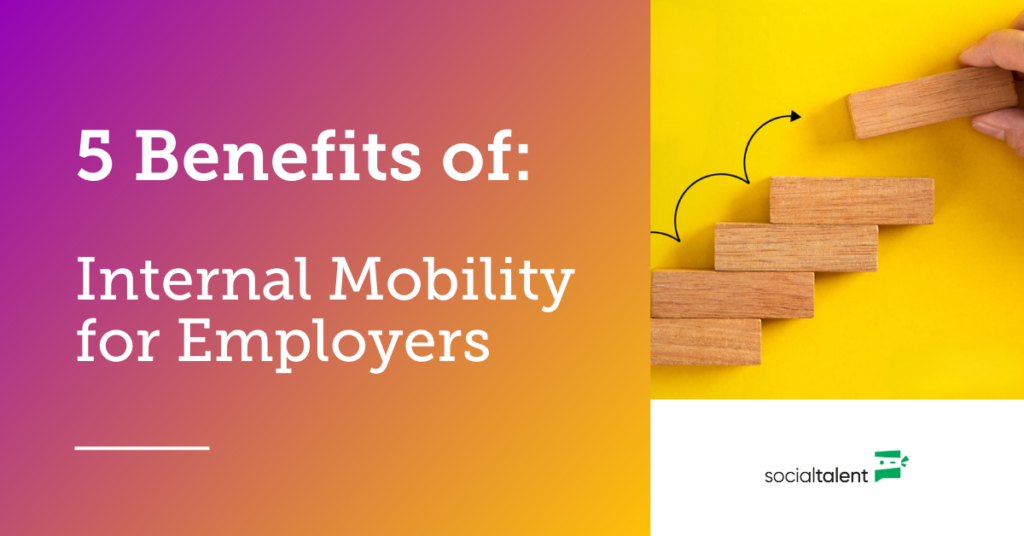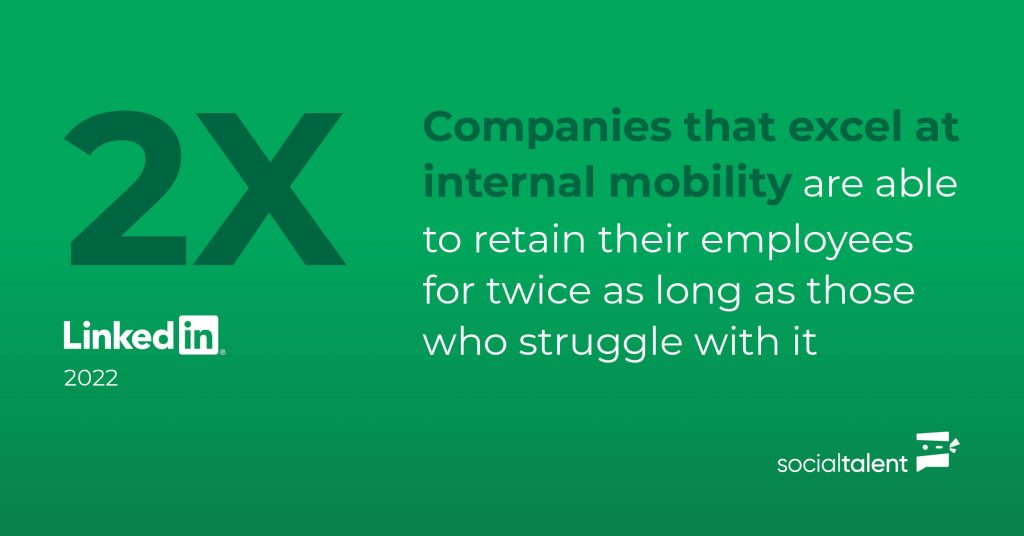5 Benefits of Internal Mobility for Employers
Welcome back to our internal mobility series! Last week, we went back to basics and established what internal mobility actually is, but for this edition, we’re looking at the benefits this function can bring to employers.

Talent shortages are a major problem for employers at the moment. Despite teetering on the edge of economic uncertainty, organizations are still struggling to find, engage, and retain the people they need. Many reasons have been suggested for this, like the lingering impact from the pandemic changing workers’ priorities, or the ever-growing skills gap. But what we know for sure is that there is a solution, and it lies in internal mobility.
We found out in our previous article that internal talent mobility doesn’t just mean promotion – it actually covers a wide range of processes, from mentorship and career development, to lateral department moves and reskilling. As a complete system, a strong culture of internal mobility can lead to some incredible advantages for any organization, and here are five of the best.
Looking to better leverage talent mobility? SocialTalent’s Internal Mobility training will help you retain and engage your people. Check it out!
5 benefits of internal mobility for employers:
1.) Improving employee retention
According to a LinkedIn Workplace Learning report, companies that excel at internal mobility are able to retain their employees for twice (2x) as long as those who struggle with it. A lack of future career development is a key driver of employee attrition. No-one wants to stagnate. By adopting a thorough program of internal mobility, you are future-proofing your workforce. It shows that you actively want to nurture talent and promote development within your organization – an attractive proposition for any employee. However, when 60% of workers believe it’s easier to find a new role with an external employer, as reported by Deloitte, companies need to reexamine their stance on internal mobility if they want to keep hold of their best talent.
Check out our blog post to learn more about employee retention.
2.) Boosting employee engagement
Only one in three millennials believe their organization is fully leveraging the skills and experience they have to offer. If employees feel underutilized or stuck, with no growth path in front of them, it leads to dissatisfaction. Offering your team members further training and an opportunity to develop naturally creates an engaged workforce who are invested and ultimately want to rise and flourish in the company. We polled over 500 HR and TA leaders at our last SocialTalent Live event and asked them what they saw as key to employee engagement. The number one response? Career growth opportunity. The employees who are flourishing are the ones equipped and enabled to grow and evolve.
Watch our SocialTalent Live event to learn more about employee engagement and internal mobility.
3.) Internal mobility can help solve the skills crisis
Offering opportunity and clear career growth also results in an agile workforce that can quickly respond to market changes, new technology, or even unprecedented situations, like the current skills crisis. Cross-functioning employees who have been encouraged to upskill can adapt easily and pivot to where an organization needs them most. Focusing on worker development also allows you to build the talent you need, rather than aimlessly look for it externally. But companies need to be intentional about this. Gartner research has shown that only 33% of candidates who sought a new job in the past 12 months searched internally first. This is a culture and mindset change – but it can give your organization the autonomy to flourish.

Check out SocialTalent’s latest e-learning solution, targeted at improving an organization’s approach to internal mobility.
4.) Expanding your employer brand and EVP
Now, as much as we have been advocating for internal talent, sometimes you still need to look externally! And you always want to make sure your organization is the destination employer, particularly by having an EVP and brand that reflects what candidates actually want. According to Lever, 33% of candidates view career growth as a motivational factor when choosing an employer. Show your commitment to talent. They want assurances that they won’t stagnate and there is opportunity to grow. By leveraging your policies and systems on internal mobility, you are building a story that candidates can buy into. Shout it from the rooftops. Make sure your careers pages, social media, and job descriptions all promote your drive for talent mobility. It could be the deciding factor for the best candidates.
5.) Internal mobility reduces the time and cost of hiring
79% of L&D professionals agree that it’s less expensive to reskill a current employee than hire a new one (LinkedIn). Recruiting externally can often be a lengthy and costly process, fraught with unknowns and complications. But the reverse is true for internal hires. Already established within the culture and processes of the company, ramp-up time will be fractional in comparison. And you also get to retain the company knowledge and relationships that the employee has acquired. As stated by Jason Richmond in an article for Oracle, organizations that promoted internally are 32% more likely to be satisfied with the quality of their hire. It’s a no-brainer!
